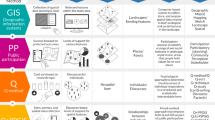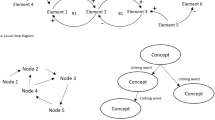Abstract
This paper presents a literature review that aimed at analyzing the use of Problem Structuring Methods in Social-Ecological Systems. These systems are formed at the interface between social and ecological systems, whose complexity is a feature and, therefore, complex problems are quite common. In the Operational Research realm, there is a class of methods that have been developed to deal with this type of problem, the Problem Structuring Methods. They seek to generate a shared understanding of complex problems from the perception of the involved actors, aiming at structuring them before solving them. Thus, it is reasonable to understand that these methods are suitable for handling complex problems in Social-Ecological Systems. This paper verified this statement through a literature review of 28 peer-reviewed papers. It contributes to both extant literature on Problem Structuring Methods and Social-Ecological Systems presenting where the interventions took place; the complex problems addressed; the Problem Structuring Methods applied, and the purpose of these methods in the interventions; the approaches used for collecting input data; the types of participants that participated of the interventions; as well as the main benefits and limitations of these methods in the interventions. It is concluded that Problem Structuring Methods are approaches that can be useful in dealing with complex problems in Social-Ecological Systems, their use should be encouraged, and some advances presented here can improve their application in these types of intervention.



Similar content being viewed by others
Data Availability
The authors confirm that all data generated or analyzed are included in this published article. Furthermore, all data supporting the findings of this study were publicly available at the time of submission, and the synthesis of the analysis carried out in this paper is available as supplementary material.
References
Abuabara L, Paucar-Caceres A (2021) Surveying applications of Strategic Options Development and Analysis (SODA) from 1989 to 2018. Eur J Oper Res 292:1051–1065. https://doi.org/10.1016/j.ejor.2020.11.032
Abuabara L, Paucar-Caceres A, Belderrain MCN, Burrowes-Cromwell T (2018) A systemic framework based on Soft or approaches to support teamwork strategy: An aviation manufacturer Brazilian company case. J Oper Res Soc 69:220–234. https://doi.org/10.1057/s41274-017-0204-9
Ackermann F (2012) Problem structuring methods “in the Dock”: Arguing the case for Soft or. Eur J Oper Res 219:652–658. https://doi.org/10.1016/j.ejor.2011.11.014
Ackermann F, Eden C (2001) SODA-Journey making and mapping in practice. In: Rosenhead J, Mingers J (eds) Rational analysis for a problematic world revisited: problem structuring methods for complexity, uncertainty and conflict. Wiley, Hoboken
Anderies JM, Janssen MA, Ostrom E (2004) A framework to analyze the robustness of social-ecological systems from an institutional perspective. Ecol Soc 9:18. https://doi.org/10.1002/9781444319910.ch1
Armstrong R (2019) Elaborating a critical realist approach to soft systems methodology. Syst Pract Action Res 32:463–480. https://doi.org/10.1007/s11213-018-9466-7
Baldwin C, Lewison RL, Lieske SN et al (2016) Using the DPSIR framework for transdisciplinary training and knowledge elicitation in the Gulf of Thailand. Ocean Coast Manag 134:163–172. https://doi.org/10.1016/j.ocecoaman.2016.09.005
Bell S (2012) DPSIR = A problem structuring method? An exploration from the “imagine” approach. Eur J Oper Res 222:350–360. https://doi.org/10.1016/j.ejor.2012.04.029
Berkes F (2017) Environmental governance for the anthropocene? Social-ecological systems, resilience, and collaborative learning. Sustain 9:1231. https://doi.org/10.3390/su9071232
Carter B, Whittaker K, Sanders C (2019) Evaluating a telehealth intervention for urinalysis monitoring in children with neurogenic bladder. J Child Health Care 23:45–62. https://doi.org/10.1177/1367493518777294
Caruzzo A, Belderrain MCN, Fisch G, Manso DF (2015) The mapping of aerospace meteorology in the Brazilian space program: Challenges and opportunities for rocket launch. J Aerosp Technol Manag 7:7–18. https://doi.org/10.5028/jatm.v7i1.461
Checkland P (2001) Soft systems methodology. In: Rosenhead J, Mingers J (eds) Rational analysis for a problematic world revisited: problem structuring methods for complexity, uncertainty and conflict. Wiley, Hoboken
Clarivate (2022) Web of Science Platform. https://clarivate.com/webofsciencegroup/solutions/webofscience-platform/. Accessed 9 Feb 2022
Cloutier R, Sauser B, Bone M, Taylor A (2015) Transitioning systems thinking to model-based systems engineering: Systemigrams to SysML models. IEEE Trans Syst Man Cybern Syst 45:662–674. https://doi.org/10.1109/TSMC.2014.2379657
Cumming GS (2014) Theoretical frameworks for the analysis of social-ecological systems. In: Social-Ecological Systems in Transition. Springer, Tokyo, pp 3–24
de Araujo WC, Oliveira-Esquerre KP, Sahin O (2021) Development of a multi-methodological approach to support the management of water supply systems. Water (MDPI) 13:1655. https://doi.org/10.3390/w13121655
Dolbeth M, Stålnacke P, Alves FL et al (2016) An integrated Pan-European perspective on coastal Lagoons management through a mosaic-DPSIR approach. Sci Rep 6:1–12. https://doi.org/10.1038/srep19400
Eden C, Ackermann F (2001) SODA-The principle. In: Rosenhead J, Mingers J (eds) Rational analysis for a problematic world revisited: problem structuring methods for complexity, uncertainty and conflict, 2nd edn. Wiley, Hoboken
EEA (1999) Environmental Indicators: Typology and Overview. European Environment Agency, Copenhagen. Tech. Rep, pp 62–67
Emes M, Smith S, Ward S, Smith A (2019) Improving the patient discharge process: implementing actions derived from a soft systems methodology study. Healh Syst 8:117–133. https://doi.org/10.1080/20476965.2018.1524405
Franco LA, Lord E (2011) Understanding multi-methodology: Evaluating the perceived impact of mixing methods for group budgetary decisions. Omega 39:362–372. https://doi.org/10.1016/j.omega.2010.06.008
Friend J (2001) The strategic choice approach. In: Rosenhead J, Mingers J (eds) Rational analysis for a problematic world revisited: problem structuring methods for complexity, uncertainty and conflict. Wiley, Hoboken
Giordano R, Pagano A, Pluchinotta I et al (2017) Modelling the complexity of the network of interactions in flood emergency management: The Lorca flash flood case. Environ Model Softw 95:180–195. https://doi.org/10.1016/j.envsoft.2017.06.026
Gomes Júnior A, de Schramm A (2022) Problem structuring methods: a review of advances over the last decade. Syst Pract Action Res 35:55–88. https://doi.org/10.1007/s11213-021-09560-1
Gomes SL, Hermans LM, Thissen WAH (2018) Extending community operational research to address institutional aspects of societal problems: Experiences from peri-urban Bangladesh. Eur J Oper Res 268:904–917. https://doi.org/10.1016/j.ejor.2017.11.007
Gregory AJ, Atkins JP, Burdon D, Elliott M (2013) A problem structuring method for ecosystem-based management: The DPSIR modelling process. Eur J Oper Res 227:558–569. https://doi.org/10.1016/j.ejor.2012.11.020
Hanafizadeh P, Ghamkhari F (2019) Elicitation of tacit knowledge using soft systems methodology. Syst Pract Action Res 32:521–555. https://doi.org/10.1007/s11213-018-9472-9
Hart D, Paucar-caceres A (2014) Using critical systems heuristics to guide second-order critique of systemic practice: exploring the environmental impact of mining operations in Southern Peru. Syst Res Behav Sci 31:197–214. https://doi.org/10.1002/sres
Hosseini SM, Rezaei A (2013) Developing an information system for sustainable natural resource management in Alborz Watershed, Northern Iran. Syst Pract Action Res 26:131–152. https://doi.org/10.1007/s11213-012-9240-1
Khadka C, Hujala T, Wolfslehner B, Vacik H (2013) Problem structuring in participatory forest planning. For Policy Econ 26:1–11. https://doi.org/10.1016/j.forpol.2012.09.008
Kok K (2009) The potential of Fuzzy Cognitive Maps for semi-quantitative scenario development, with an example from Brazil. Glob Environ Chang 19:122–133. https://doi.org/10.1016/j.gloenvcha.2008.08.003
Lamé G, Jouini O, Stal-Le Cardinal J (2019) Combining Soft Systems Methodology, ethnographic observation, and discrete-event simulation: A case study in cancer care. J Oper Res Soc 0:1–18. https://doi.org/10.1080/01605682.2019.1610339
Laouris Y, Michaelides M (2018) Structured democratic dialogue: An application of a mathematical problem structuring method to facilitate reforms with local authorities in Cyprus. Eur J Oper Res 268:918–931. https://doi.org/10.1016/j.ejor.2017.04.039
López AEA, Cajiao MCR, Mejia MP et al (2019) Participatory design and technologies for sustainable development: an approach from action research. Syst Pract Action Res 32:167–191. https://doi.org/10.1007/s11213-018-9459-6
Markowska J, Szalińska W, Dąbrowska J, Brząkała M (2020) The concept of a participatory approach to water management on a reservoir in response to wicked problems. J Environ Manage 259:109626. https://doi.org/10.1016/j.jenvman.2019.109626
Mayring P (2003) Qualitative Inhaltanalyse Grundlagenund Techniken (Qualitative Content Analysis), 8th edn. Beltz Verlag, Weinheim
Mingers J, Rosenhead J (2004) Problem structuring methods in action. Eur J Oper Res 152:530–554. https://doi.org/10.1016/S0377-2217(03)00056-0
Mingers J, White L (2010) A review of the recent contribution of systems thinking to operational research and management science. Eur J Oper Res 207:1147–1161. https://doi.org/10.1016/j.ejor.2009.12.019
Nguyen TTN, Scognamillo DG, Comer CE (2019) Revealing community perceptions for ecological restoration using a soft system methodology. Syst Pract Action Res 32:429–442. https://doi.org/10.1007/s11213-018-9463-x
Ostrom E (2009) A general framework for analyzing sustainability of social-ecological systems. Sci (80-) 325:419–422. https://doi.org/10.1126/science.1172133
Pereira L, de Morais S (2020a) The strategic choice approach to the maintenance management of a water distribution system. Urban Water J 17:23–31. https://doi.org/10.1080/1573062X.2020.1734945
Pereira L, de Morais S (2020b) Multicriteria decision model to establish maintenance priorities for wells in a groundwater system. Water Resour Manag 34:377–392. https://doi.org/10.1007/s11269-019-02457-8
Pereira L, de Morais S, Figueira DC (2020) Using criticality categories to evaluate water distribution networks and improve maintenance management. Sustain Cities Soc 61:102308. https://doi.org/10.1016/j.scs.2020.102308
Pinzon-Salcedo LA, Torres-Cuello MA (2018) Community operational research: Developing a systemic peace education programme involving urban and rural communities in Colombia. Eur J Oper Res 268:946–959. https://doi.org/10.1016/j.ejor.2017.11.040
Powell JH, Mustafee N (2017) Widening requirements capture with soft methods: An investigation of hybrid M&S studies in health care. J Oper Res Soc 68:1211–1222. https://doi.org/10.1057/s41274-016-0147-6
Rivero NPP, Morais DC, Pereira LS (2020) Assessment of actions to tackle the shortages of water in La Paz, Bolivia. Water Policy 22:177–192. https://doi.org/10.2166/wp.2020.087
Rosenhead J (2006) Past, present and future of problem structuring methods. J Oper Res Soc 57:759–765. https://doi.org/10.1057/palgrave.jors.2602206
Rosenhead J (1996) What’s the problem? An introduction to problem structuring methods. Interfaces (Providence) 26:117–131. https://doi.org/10.1287/inte.26.6.117
Santoro S, Pluchinotta I, Pagano A et al (2019) Assessing stakeholders’ risk perception to promote Nature Based Solutions as flood protection strategies: The case of the Glinščica river (Slovenia). Sci Total Environ 655:188–201. https://doi.org/10.1016/j.scitotenv.2018.11.116
Santos LD, Schlindwein SL, Fantini AC et al (2019) Structuring contrasting forest stakeholders’ views with the Strategic Options Development and Analysis (SODA) approach. Int For Rev 21:501–515. https://doi.org/10.1505/146554819827906834
Schatz D, Bashroush R (2018) Corporate information security investment decisions: A qualitative data analysis approach. Int J Enterp Inf Syst 14:1–20. https://doi.org/10.4018/IJEIS.2018040101
Schramm VB, Schramm F (2018) An approach for supporting problem structuring in water resources management and planning. Water Resour Manag 32:2955–2968. https://doi.org/10.1007/s11269-018-1966-9
Scrieciu A, Pagano A, Coletta VR et al (2021) Bayesian belief networks for integrating scientific and stakeholders' knowledge to support nature-based solution implementation. Front Earth Sci 9:1–18. https://doi.org/10.3389/feart.2021.674618
Slotte S, Hämäläinen RP (2015) Decision structuring dialogue. EURO J Decis Process 3:141–159. https://doi.org/10.1007/s40070-014-0028-7
Smith CM, Shaw D (2019) The characteristics of problem structuring methods: A literature review. Eur J Oper Res 274:403–416. https://doi.org/10.1016/j.ejor.2018.05.003
Souza Júnior CB, Koch H, Siegmund-Schultze M, Köppel J (2021) An exploratory scenario analysis of strategic pathways towards a sustainable electricity system of the drought-stricken São Francisco River Basin. Energy Syst 12:563–602. https://doi.org/10.1007/s12667-019-00343-1
Unalan D (2013) Ecosystem-based management in challenging conditions: Implications of a case study from north-eastern Turkey. Int J Water Resour Dev 29:574–587. https://doi.org/10.1080/07900627.2013.766535
Watkin LJ, Kemp PS, Williams ID, Harwood IA (2012) Managing sustainable development conflicts: The impact of stakeholders in small-scale hydropower schemes. Environ Manage 49:1208–1223. https://doi.org/10.1007/s00267-012-9857-y
Zare F, Elsawah S, Bagheri A et al (2019) Improved integrated water resource modelling by combining DPSIR and system dynamics conceptual modelling techniques. J Environ Manage 246:27–41. https://doi.org/10.1016/j.jenvman.2019.05.033
Acknowledgements
This study was financed in part by the Coordenação de Aperfeiçoamento de Pessoal de Nível Superior – Brasil (CAPES), Finance Code 001.
Author information
Authors and Affiliations
Corresponding author
Ethics declarations
None of the authors of this paper has a financial or personal relationship with other people or organizations that could inappropriately influence or bias the content of the paper.
There are no Competing interests or Conflicts of Interest with other people or organizations that could inappropriately influence or bias the content of the paper.
Additional information
Publisher’s Note
Springer Nature remains neutral with regard to jurisdictional claims in published maps and institutional affiliations.
Supplementary Information
Below is the link to the electronic supplementary material.
ESM 1
(DOCX 198 KB)
Rights and permissions
Springer Nature or its licensor holds exclusive rights to this article under a publishing agreement with the author(s) or other rightsholder(s); author self-archiving of the accepted manuscript version of this article is solely governed by the terms of such publishing agreement and applicable law.
About this article
Cite this article
Gomes Júnior, A.d.A., Schramm, V.B. & Schramm, F. Problem Structuring Methods in Social-Ecological Systems. Syst Pract Action Res 36, 461–478 (2023). https://doi.org/10.1007/s11213-022-09617-9
Accepted:
Published:
Issue Date:
DOI: https://doi.org/10.1007/s11213-022-09617-9




